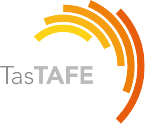TasTAFE

Awareness training improves understanding of Tasmanian Aboriginal culture
Thousands of TasTAFE students have had the opportunity to improve their understanding and knowledge of Tasmanian Aboriginal culture thanks to a suite of training offered by the Aboriginal Support Programs team.
TasTAFE’s dedicated Aboriginal Support team have delivered Cultural Awareness Training to more than 2500 students since 2019, with the purpose of the training being two-fold.
TasTAFE Student Support Manager, International and Aboriginal Support Services, Lyndel Holton, said the training helped students meet the requirements of the diversity units in their studies as well as improve their overall understanding and knowledge of Tasmanian Aboriginal people, history and culture.
She said TasTAFE classes can participate in any or all of three training options.
“From Gumnuts to Buttons is a two-hour cultural awareness session providing a walk through Tasmanian history from an Aboriginal perspective.
“This is an interactive activity giving participants the opportunity to reconsider Eurocentric interpretations of the early “settlement” of Tasmania and look through the eyes of Tasmanian Aboriginal people.
“Students take part in the narration with a presenter adding and removing items from a map of Tasmania. Buttons represent settlers/colonisers and gumnuts represent Aboriginal people. There are other actions occurring during the presentation that surprise and shock the participants.
“We find that this is a real eye-opener for many of our students.
“We get quite a lot of feedback where people say they had absolutely no idea about what happened to Tasmanian Aboriginal people. We often have students becoming very emotional during the training, but we provide a safe and supportive environment.
“By understanding what happened in the past students are provided with a context for the future and it helps ensure the past isn’t repeated,” Ms Holton said.
Cultural Conversations is a session where students can ask more specific/targeted questions about their assessment and working with Aboriginal people out in industry.
“Once they learn about their history, listen to the presenters and hear about their lived experience, students can learn more about Tasmanian Aboriginal people and other Aboriginal nations and communities around Australia,” Ms Holton said.
The training is popular with TasTAFE classes in areas like nursing, individual support, community services and early childhood education and care which include units on diversity.
“Our presenters provide students with some advice, hints and tips on what they can do to increase their cultural awareness and cultural safety within the workplace and what strategies they can consider when working with Aboriginal people.
“It’s about helping them with how they can sensitively and effectively work with the Aboriginal community.
“For example, for Aged Care students it includes things like current practices for working with Aboriginal elders and information on Closing the Gap. We give lots of hints and tips. It’s about simple acts that show cultural respect,” Ms Holton said.
The third type of Cultural Awareness training offered to students at TasTAFE is Ask Away. This is a series of videos developed by the Tasmanian Health Service to help improve the cultural competency of staff.
Inspired by the ABC TV series You Can’t Ask That! the Ask Away videos feature 13 Tasmanian Aboriginal people answering questions that were submitted anonymously and presented to them at the time of filming. Directed and edited by Tasmanian Aboriginal people, topics covered include Identity, Stereotypes (suck), Truth and History and Looking after our Health.
Ms Holton said after viewing the videos, questions are posed to the group to initiate discussion and encourage reflective thinking.
“Nothing is off limits and we create a safe space for students to ask questions.
The program also generates some casual employment of Tasmanian Aboriginal community members, who are engaged as Cultural Awareness Assistants (CAA). The CAA’s support the presentation and assist with the conversations that follow. They bring their personal experiences and cultural knowledge to the discussion, providing students with a rich and diverse perspective of Tasmanian Aboriginal people, culture and community.
“We hope our suite of Aboriginal Cultural Awareness Training will inspire students to seek further information and grow their knowledge of Aboriginal people, culture and history while making themselves and the broader community more understanding, respectful and inclusive,” Ms Holton said.
